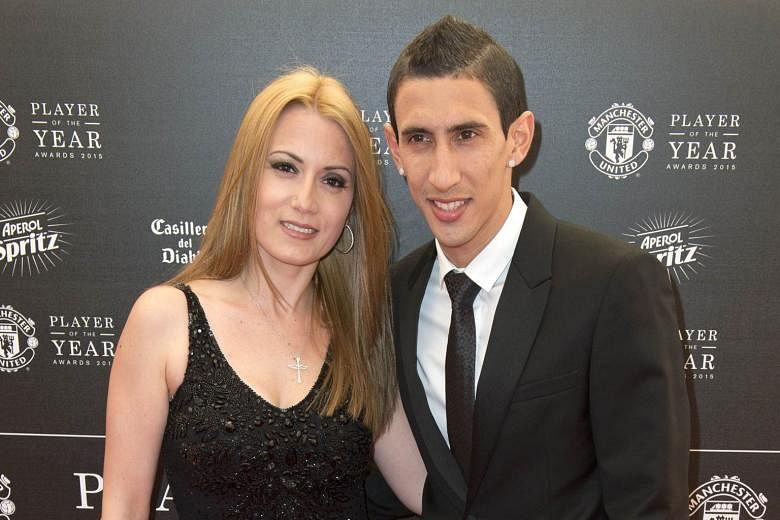England's clubs are already doing what businesses the world over do, spending in advance much of the £8 billion (S$17.2 billion) in television money that will flood in from next summer.
The deal, £5.13 billion from the Sky TV and BT Sport competition in Britain, added to more than £3 billion from overseas rights, represents a 70 per cent mark up on what the English Premier League (EPL) teams get now - and an almost incomprehensible mark-up on the original £191 million negotiated when the top 20 clubs broke away from the old Football League in 1992.
That deal was spread over five years, the next contract covers just three seasons.
At the same time, the clubs bank their own sponsorship millions, and the gate receipts that keep on rising above the cost of living index.
Richard Scudamore, the chief executive (and therefore chief negotiator) of this seemingly eternal money machine, was asked when the new TV rights agreement was struck whether the money making had become obscene.
-
EPL TV DEALS - PRICE PER MATCH
-
1992-97, THE FIRST DEAL
£633k -
2013-16
£6.5m -
2016-19
£10.2m
"Obscene?" he echoed. "It is not. It is market forces. It is unscripted drama."
Mr Scudamore is good at his job. He just lacks the perspective of the fan being fleeced for ever-higher TV subscriptions, and never decreasing entry prices should they actually wish to see their heroes in the flesh.
And what heroes are these?
Last Monday's flight by Angel di Maria from Manchester United to Paris St-Germain told its own story.
He was in Argentina when he should have been on duty with United at the start of the second year in his four-year contract. instead, he went AWOL, and then took a plane from Buenos Aires to Doha, the capital of Qatar.
Why so? Because the PSG owner is the ruling family of Qatar who, wishing to make them challengers in the Champions League, is spending like Manchester City's Abu Dhabi owners, like Roman Abramovich for Chelsea, and like Singapore's Peter Lim to an extent at Valencia, to put their adopted teams on the European map.
Correction, on the world map, via global TV.
Di Maria's defection is perhaps his own affair. Or it would be if football was simply business and not in some way the property of the fans who, worldwide, pay with their heart and soul (and purse) to belong to clubs.
You don't need me to tell you what Manchester United, or Liverpool, Barcelona, Real Madrid or, for heavens sake Everton or Crystal Palace, mean down your way.
A fan's allegiance to a particular team is usually born in childhood and lasts until death. A player like di Maria can literally be Real Madrid one season, United the next, and then devoted to PSG the season after.
He's good, don't get me wrong on that. When di Maria is on song he's like a whippet on speed. He can be brave too, so the image of him quitting Manchester because his wife was frightened by an attempted burglary on their palatial home last autumn might need a rather large pinch of salt.
The bottom line is that di Maria, managed by the agent Jorge Mendes whose stable has everyone from Cristiano Ronaldo to Jose Mourinho, is a financial grasshopper - an opportunist leaping to the ownership who dangles the best price.
We are told that di Maria's salary in PSG will be over £170,000 per week, over and above taxation.
It would be nice for the Parisians if they see the best of him for rather longer than the first few electric months he gave Old Trafford.
And I'm trying to make allowances for the fact that the demands on him, by aggressive opponents and by the dictatorial United coach Louis van Gaal, might have blunted the Argentinian player's appetite for the green grass pitches of England.
Arsenal, incidentally, are rather hoping that Mesut Oezil will this season get to grips with that physicality and show some consistency of his marvellous skills because he could be a crucial player in the Gunners' long-hoped-for revival as true title candidates.
However, back to the money. The race to stay in the Premiership, let alone win it, is heightened by that carrot of so many more millions in the communal pot next spring.
Jose Mourinho put his finger on the spending mentality when he pointed out that it is getting ever more competitive. "Look at what Stoke are spending," he said. "Look at Crystal Palace signing Yohan Cabaye from Paris Saint-Germain."
Well, yes indeed. And look at the billion pounds, or more, that Chelski and Abu Dhabi City spent, making Arsene Wenger speak jealousy in the past of opponents winning through "financial doping".
Also look at what is happening in other countries. Barcelona and Real Madrid have not, up to now, had to share TV proceeds with the remainder of their league. Each was able to barter separately with the domestic TV companies, and bank upwards of £100 million per season from that source alone while clubs at the foot of La Liga made do on less than £13 million.
That has led to bankruptcy hearings this summer, and to government intervention. From 2016, the Spanish league must adopt a more equable share out of broadcasting money, and so Barcelona and Madrid will have to keep their omnipotence if they can through merchandising and selling their identity, as is already happening with Qatar's name on the Barca shirt.
Forgive me if this all sounds too mercenary, and too far from the flesh and blood (and skills) that you tune in for. Blame that box in the corner of the room, or just blame modernity.
The reality is that massive clubs in England, Spain and Germany - and lapsed clubs in Italy and an Arabic makeover in Paris - have always made money talk and will continue to do so.
I can't see anyone breaking the four-club domination in England that we saw from Chelsea, City, Arsenal and United last season.
I expect the Spanish giants to continue, but with a more feisty challenge from Atletico Madrid boosted by Chinese financial input, and Valencia. I see little prospect of Bayern Munich losing their power in the Bundesliga any time soon. Or of any major disruption to Juventus in Serie A although foreign money is coming to AC and Inter Milan, and to Roma.
To break the cycle you need huge investment, and then, somewhere down the line, superstars whose inclination is to stay longer than one season in one league.


